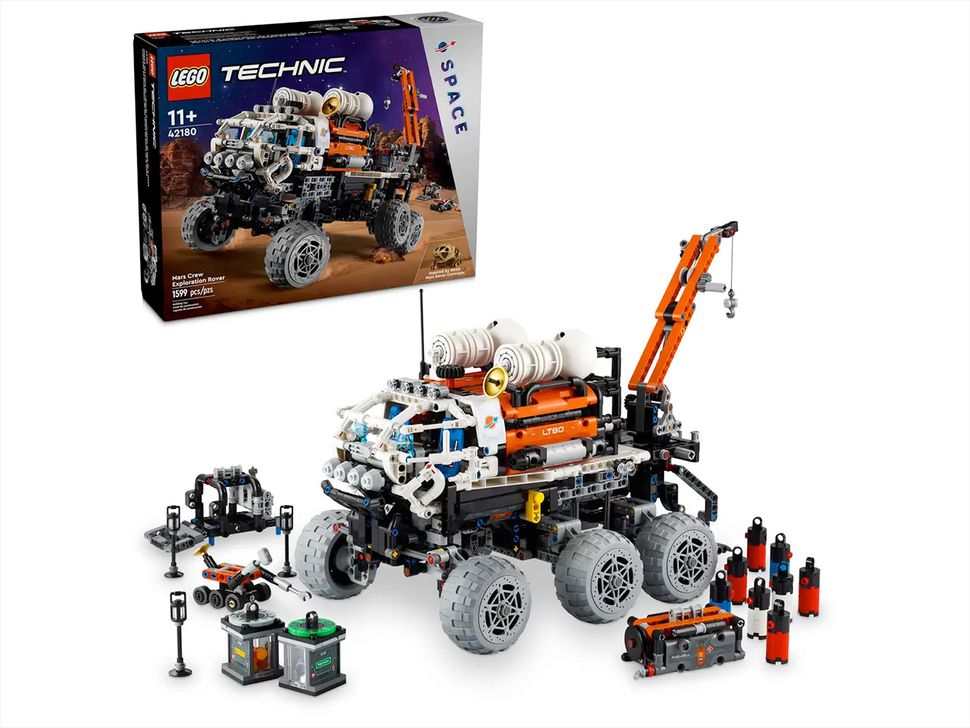Lego and NASA have a long history of collaborating, but a recently released building set launched the partnership in a new direction — both for the toy company and the space agency.
The new Mars Crew Exploration Rover, which went on sale earlier this month, is unlike any space vehicle that Lego — or NASA — has ever built. For Lego, it was the first time that its Technic line of advanced working models focused on a fictional space vehicle. Similarly, this was the first time NASA engineers advised on a Lego toy that was not in some way based on any of the agency’s plans or spacecraft.
“This was very refreshing for all of us, because we were designing with more freedom,” said Aurélien Rouffiange, the design manager who led the creation of the Lego Technic Mars Crew Exploration Rover, in a presentation to fan media and content creators.
Related: Best Lego space sets 2024: NASA sets, spaceships and more

Although the rover is fictional and set in the future, Lego still wanted to keep it realistic rather than go full sci-fi, which is where NASA’s input was needed.
“When you look this vehicle, we want to you to say, ‘Okay, that can happen.’ That is where we wanted to set the limit,” said Rouffiange. “So after a [little] brainstorming, which I was very lucky to be part of — I mean, it’s not every day that you get to talk with a NASA engineer — we came up with this concept.”
The Mars Crew Exploration Rover is a six-wheel, two-seat mobile transport that features an expanding truck bed, working suspension, a working crane, living quarters and a slew of scientific equipment and logistics canisters. The $149.99 Technic set includes 1,599 pieces and, as described on the front of its packaging, is “inspired by NASA Mars rover concepts.”
“It is kind of a campervan for space,” said Rouffiange. “There is space for two crew members. You can open it and there is a whole living space inside. So you have a treadmill and shower … all that astronauts need to survive on the planet. And then at the back, there are loads of cans for findings.”
And “loads” is not exaggerating. There are different containers for the crew’s trash, Mars rocks and science samples, water, oxygen and hydrogen. In addition, the rover carries its own deployable fuel cell generator, with which to recharge its batteries.
“We know that hydrogen will be a big part of our future, and we want to teach the kids — and you — how it works,” he said.
In addition to its working crane for on- and off-loading equipment, the rear of the rover also has a lift.
“One of the first things the people from NASA told me is that, once in their spacesuits, [the astronauts] can’t jump off the rover. They can’t run or do things like that. So they need something to get off this vehicle, so I built in an elevator,” Rouffiange said.
Another consideration was the vehicle’s wheels. The rover features the same type of “rocker-bogie” suspension that can be found today on NASA’s rovers Curiosity and Perseverance, allowing them to more easily traverse uneven terrain and roll over small boulders. But Lego has traditionally modeled its wheels in black, so it was something of a big ask when Rouffiange sought to produce the rover’s tires in another color.
“At the first meeting we had with NASA, I asked ‘Can we use rubber in space?’ And with such a variation of temperature, you can’t, because the tires would explode or something bad like that would happen, and it’s not great to change tires in space. So that’s why they go with a metallic coating, for more traction and stuff like that,” said Rouffiange. “The best result for us was to change the tires to gray to make them look like they were metal.”
The Mars Crew Exploration Rover is one of three new space-themed, fictional vehicles released as part of the Lego Technic line. The other two — the Surface Space Loader and VTOL Heavy Cargo Spaceship — are set farther off into the future and so were designed without NASA’s input. The three vehicles do share a common livery, though, with the gray wheels also part of the space loader and all three introducing a new bright orange that is new to Lego with these sets.
Related: Best space games 2024: Outer Wilds, No Man’s Sky, Kerbal Space Program and more
NASA’s engineers had two other words of advice for the Lego designers. First, they said, it would be impossible to launch and reposition a rover of this size given that it is too long to fit into any type of realistic rocket fairing.
“So we make it smaller,” said Rouffiange, as he demonstrated how the entire chassis contracts to become a shorter vehicle. “You can still drive it around in this compact mode, but, of course, it is not meant for that.”
The other thing NASA stressed the rover needed involved the living quarters.
“They said [the astronauts] need a toilet,” said Rouffiange. “And we thought they were joking about this, but [no], they needed a toilet.”
Follow collectSPACE.com on Facebook and on Twitter at @collectSPACE. Copyright 2024 collectSPACE.com. All rights reserved.